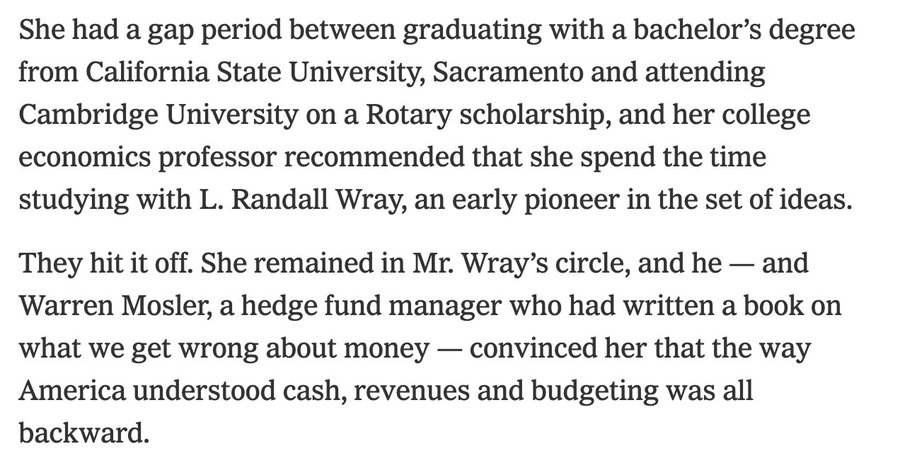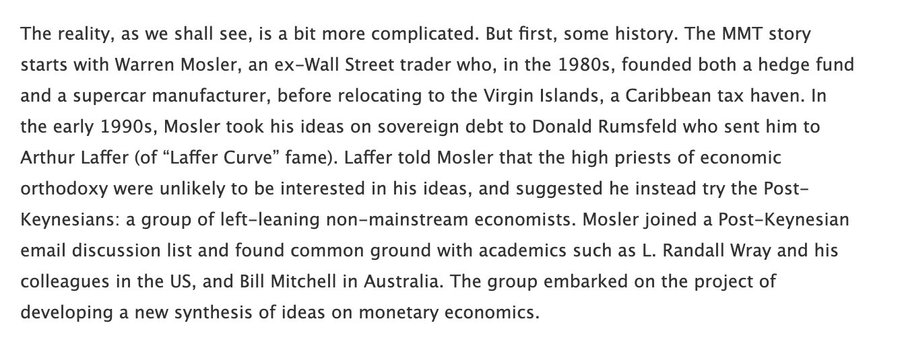Belligerent Savant wrote:MMT is broadly on the defense of late due to current market conditions)
https://www.progressivepolicy.org/press ... cticality/
PPI REPORT DECONSTRUCTS MODERN MONETARY THEORY AND DEMANDS ADVOCATES PROVE ECONOMIC AND POLITICAL PRACTICALITY
Yep, there's been a spate of attack pieces in major outlets. One critic is a guy who writes in his
textbook:
"When you put your money in the bank, your bank takes your money and puts it to work by lending it out."This is so fundamentally incorrect, so horribly wrong, it boggles the mind that any serious economists—let alone those who claim to be practicing
science—still write such misguided and/or misleading falsities. The current bestselling econ textbook, by Greg Mankiw, teaches the same false crap. The Federal Reserve has
told educators to stop teaching it. See also
Bank of England bulletins that
specifically refute the entirely false notion that banks lend out customer savings.
But these orthodox economists reject reality and continue to teach crap.
Why do they do it? They're protecting their turf and status. They're also protecting the status quo power relationships (but
shhhh!—they very seldom openly acknowledge power).
The defenders Ptolemaic astronomy clung to their model—"C'mon,everybody
knows the Sun orbits around the Earth! Just go outside, it's obvious!" Galileo was jailed for pointing out simple realities.
The defenders of the phlogostin theory of combustion held on by their white knuckles until they had to be dragged kicking and screaming into a world that had discovered oxygen. Today, phlogostin is the stuff of jokes.
When X-rays were discovered, they didn't violate accepted theory, but "they violated deeply entrenched expectations" (
Kuhn) to the extent that "Lord Kelvin at first pronounced them an elaborate hoax." A lot of scientific work had to be
redone in light of X-rays.
Economics is at a crisis. The old models have too many anomalies to ignore. Little wonder, as the models were clearly devised to favor one ideology over others, and that's not how we should do science—even such fake science as neoclassical economics.
As Kuhn points out,
"professionalization leads...to an immense restriction of the scientist’s vision and to a considerable resistance to paradigm change," and,
Almost always the men who achieve these fundamental inventions of a new paradigm have been either very young or very new to the field whose paradigm they change. And perhaps that point need not have been made explicit, for obviously these are the men who, being little committed by prior practice to the traditional rules of normal science, are particularly likely to see that those rules no longer define a playable game and to conceive another set that can replace them.
One thing about MMT is that in one important sense, its findings are not new; this argument—between "sound money" and "credit money"—has been going on for centuries. However, MMT points out that in 1971 when the world abondoned the pretense of a gold standard, 'everything changed'—
except the textbooks. What's new is the coherent, historically accountable and factually correct analysis of the money system.
Mainstream economists continue teaching wrong stuff not only because "science students [necessarily] accept theories on the authority of teacher and text, not because of evidence" (Kuhn), but because the assertion, "banks loan out customer savings" is ideological —it implies a false quality of money as a private creation rather than a public utility. This conception of money is at the root of the neoliberal "trickle down" fraud that has plagued the world for 50 years.
So, in this PPI article, it's really orthodoxy defending itself, by lashing out with whatever partial, disingenuous, sophistic and dishonest means they can. There's a semi-conciliatory note, at least, encouraging study, but the analysis of MMT is typically sloppy and ideologically driven.
Note, the intellectual home of the paper's author, Eric Leeper is the University of Virginia—the school notorious for the sick and weirdly named "Public Choice Theory" and its exponent, economist James M. Buchanan (see
post in this thread about Buchanan), and what is called
the "Virginia School". Suffice for now to say it's some of the most vile social thinking of the last 200 years.
Note that PPI is explicitly an exponent of the "New Democrats" and they helped to infiltrate neoliberalism into the Democratic party.
PPI is Clinton Democrats. "Progressive Policy" Institute, my ass. These PPI barnacles are not progressives.
Let's jump into the dumpster:
For several years, politicians and leaders on the Far Left argued that a monetarily sovereign nation, like the United States, can simply print more currency needed to purchase goods and services for its constituents.
"Far Left" is a dog whistle. The rest of the sentence describes how money is issued, but orthodox economics ignores the sources of money—it just assumes money exists! I'm not making this up, this is how fucked up the field is. So naturally the idea that money is created somewhere violates the neoclassicists'
restricted vision and makes them very nervous. Plus, they loathe to acknowledge that money issues from the state.
Mr. Leeper calls for the advocates of MMT to persuade the economic community that the standing norms of economic theory no longer serve us well
Does Mr. Leeper honestly think the economics of the last 50 years is serving us well? Holy fuck.
continue to follow the science on economic theory and history – which unwaveringly points away from MMT’s fiscal financing plans.
"Follow the science."

MMT's insights are largely drawn from 5,000 years of economic history. The "science" of neoclassical economics would never hold under legitimate, peer-reviewed scientific scrutiny.
As more exorbitant expensive spending programs were introduced and pitched to the American public, politicians often leaned on MMT to ensure voters that the economy could remain strong, even with deficit-financed spending.
There has never been a period of prosperity in the US that wasn't accompanied by large deficits. And I can count on one hand the politicians who ever "leaned on MMT."
This report breaks down several flaws in the economic thought behind MMT, including [...] the inability of MMT to explain the relationship between inflation and demand when an economy is operating below its resource constraint,
More lazy, dishonest assertion. Is the writer trying to claim that Covid-19 did not cause resource constraints?
how it would overcome the structural and political challenges that prevent elected lawmakers from responsively managing inflation,
Look around. What are most people, including politicians, the most concerned about right now? Inflation. Voters are not approving of inflation, politicians are scared shitless of it, both sets together are a bulwark against inflationary policies. (Too bad that many can't see that raising interest rates is itself inflationary, and worsens inequality). Moreover it is clearly the mainstream—not MMT—that
lacks a coherent theory of inflation.
said Ben Ritz, Director of PPI’s Center for Funding America’s Future. “Now that inflation has finally materialized, they’ve moved the goalposts and left policymakers seeking answers about what to do in response. Dr. Leeper’s thorough deconstruction of MMT makes clear that they have none to offer. Democrats should reject this ‘supply-side economics’ of the left that is nothing more than a recipe for economic misery.”
The MMT literature, before and after Covid, is filled with "what to do in response" to inflation. And how special—phony "progressives" attacking the left. Nauseating.
and the indiscriminate approach it takes to the impact of different tax and spending policies, among others.
This comes up in Leeper's paper, which I skimmed. MMT points out that various taxes have different purposes: the indiscriminate approach to taxation is the mainstream approach, which sees federal taxes (and government bonds) as serving
one function: to raise revenues for spending.
They could not be more mistaken.Wait—yes, they
could be more mistaken. Leeper's paper is jam-packed with inconsistent and incomplete critiques, and relies completely on the usual, out-dated, discredited approaches such as monetarism, Quantity Theory of Money, the Phillips Curve, "natural rates of unemploymet" (which vary as they keep adjusting it when its predictions fail), and so on. He argues that US government bonds are "backed" by "future taxes"—a notion that appears
only in textbooks, but not in reality.
It's astonishing how these very serious people can be so wrong. Despite citing and quoting some MMT researchers, Leeper continually mischaracterize what MMT teaches, and counters it with all the above garbage. An exhaustive rebuttal of the paper is more than I have time for right now, but I'll look for any existing review by MMT writers. And FWIW, the sources for rebuttal can be found in this thread.
Leeper and the PPI self-appointed gatekeepers are arguing from a failed paradigm. To quote Kuhn:
Like the choice between competing political institutions, that between competing paradigms proves to be a choice between incompatible modes of community life. Because it has that character, the choice is not and cannot be determined merely by the evaluative procedures characteristic of normal science, for these depend in part upon a particular paradigm, and that paradigm is at issue. When paradigms enter, as they must, into a debate about paradigm choice, their role is necessarily circular. Each group uses its own paradigm to argue in that paradigm’s defense.
Overthrowing paradigms is a bitch.
(Edited for typo)



